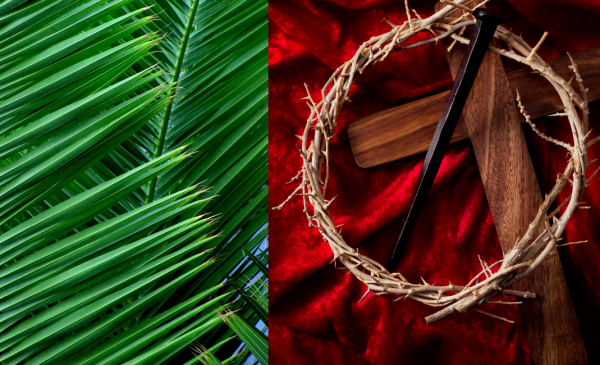WONDERING GURU
At The Procession with Palms – Mark 11:1-10 or John 12:12-16
(Isaiah 50:4-7; Psalm 22:8-9, 17-20, 23-24; Philippians 2:6-11c; Mark 14:1-15:47)

We get the name
"Palm” Sunday because as Jesus rode into Jerusalem, the disciples laid
down palm fronds on the road ahead of the donkey. Some translations refer to
them as “leafy branches cut from the fields.” In the culture of their day, a
king would ride into town on a horse if he wanted the people to know that he
was ready for war and that he was their warrior king. However, when a king rode
into town on a donkey, that symbolized the time of peace was at hand. Jesus
chose a donkey to show that the time for peace and love had come. The people
were awaiting the king, but most of them thought the king would be an earthly
king that would readily protect Jerusalem from all enemies. Jesus, however,
came as a king of peace.
Today’s Sunday is also known as “Passion Sunday.”
Let’s explore the difference between the two: Palm Sunday vs Passion Sunday. “Palm
Sunday” could refer to the events that fulfilled the prophecies of long ago.
The prophecies that Zechariah foretold about the king who would ride into
Jerusalem on a borrowed donkey and how the people went crazy with hope that
they would be saved from the cruel Roman Empire.
But on the other hand, “Passion Sunday”, could tell a
totally different story. This parade could refer to a funeral procession. This
day marked the beginning of the end; the week of betrayal; and the week that
would end in suffering and death. “Passion Sunday”, could refer to the stories
of the last supper, and how Jesus shared with his disciples those things he
wanted them to remember most.
When the Palm Sunday crowd saw Jesus riding into
Jerusalem that day, they knew that something exciting was happening. They knew
that Jesus was riding as the Messiah would, and they thought they knew what
that meant. They thought it meant they would be free from the Romans, they
thought it meant that Jesus was going to be their King. On the other hand, the
Good Friday crowd turned against Jesus because he didn’t fulfill the dreams,
they had of him the Sunday before.
This Palm Sunday Hosanna episode in the gospels seems
a bit out of place because we know where Jesus is going. We know he is not
going to Herod’s palace. We know he is not going to confront the Roman
authorities. We know he is not going to topple the corruption of the temple
leaders. We know he is marching through this city, going through this triumph,
heading for a vicious cross. And we wonder, what do the words of triumph mean.
What do their hosannas mean? Hosanna actually means save us. Imagine the Palm
Sunday crowd saw this man as their king, and they thought he would save them in
the way other great leaders had saved them. Looking to be saved from the
oppression of a Roman occupation, from those in the temple who collaborated
with the occupiers.
But Jesus wanted them to see the reality of who he
was, not an earthly king, but a heavenly king. He was not a warrior who would
come to destroy the Romans. Jesus was a warrior who would come to destroy sin
and death. Jesus was painting a picture
of a suffering Messiah. A Messiah who would suffer for the sins of all the people.
Dietrich Bonhoeffer wrote: "God
allows himself to be edged out of the world and on to the cross and that is the
way, the only way, in which he can be with us and help us. Only a suffering God
can help." The crowds on that first
Palm Sunday wanted a Warrior King, but Jesus came as a suffering Messiah. Jesus
came as one who would die on a cross for the sake of human kind.
Palm Sundays/ Celebrations in our life teach us nothing but we learn great wisdom and life’s lessons on Passion Sundays/Sufferings.



No comments:
Post a Comment